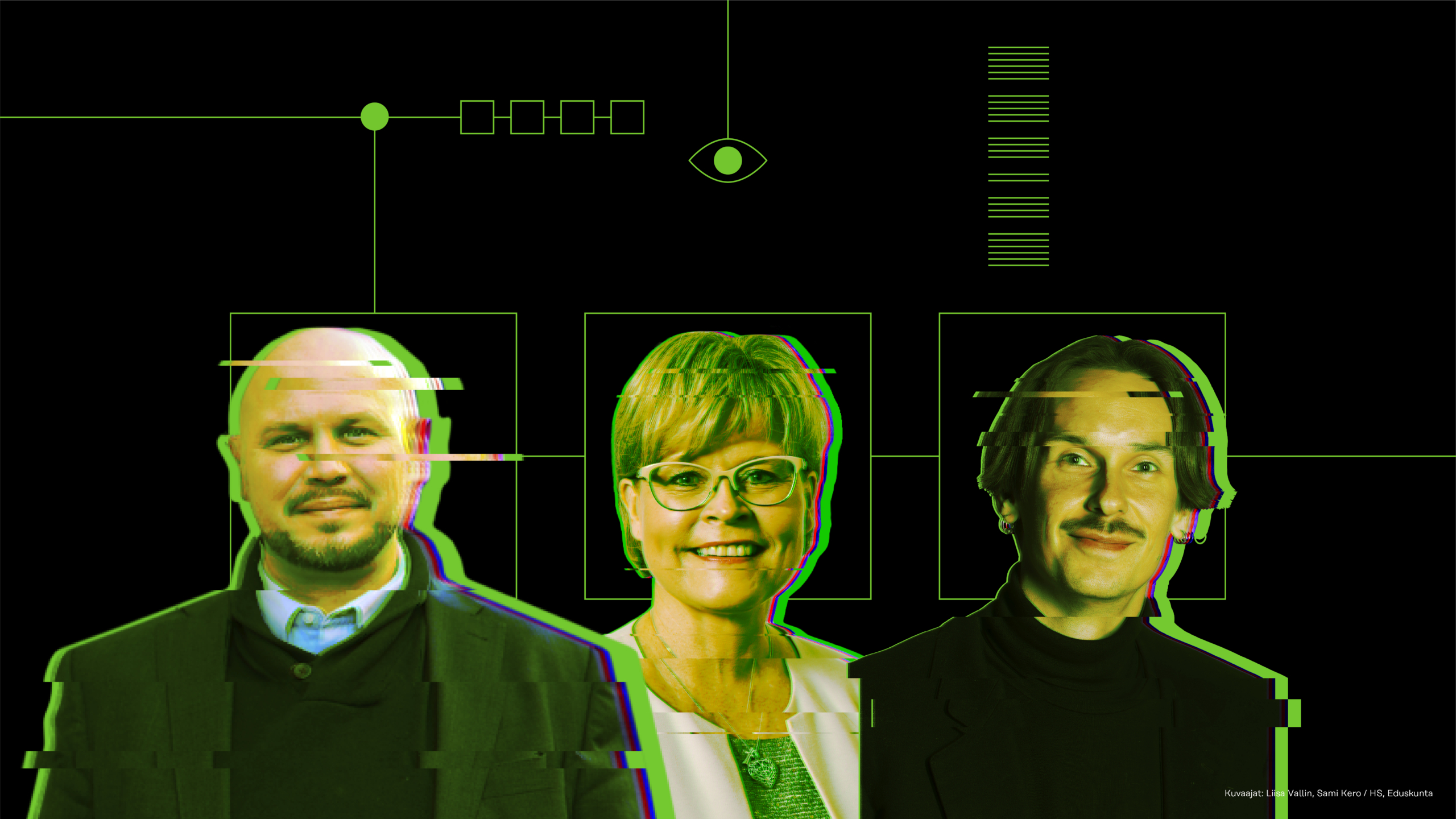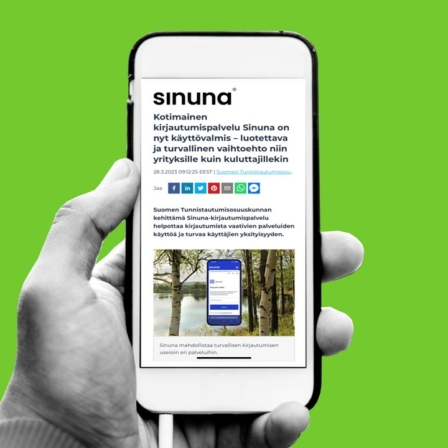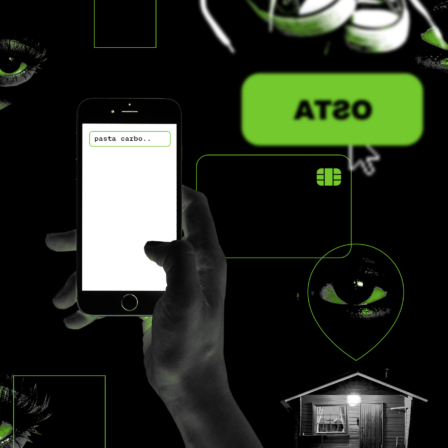The change in how data is collected and used is the biggest cultural change humanity has experienced in a single generation. Legislation is struggling to keep pace as change creeps insidiously and rapidly into the fabric of society. The Cambridge Analytica scandal, the attack on the US House of Congress and hostile online debating are some of the examples of the threats to democracy posed by data collection. This is the opinion of the Finnish participants of the Digipower investigation, Niclas Storås, journalist for HS Vision, Sari Tanus, MP, and Dan Koivulaakso, State Secretary.
In Sitra’s Digipower investigation, the test subjects will monitor the flow of data about themselves using a monitoring app installed on their test phones and through subject access requests sent to companies and organisations. Together with their personal “data coaches,” the participants will review their data, go deeper into it and examine the results of their subject access requests against the set targets.
In this article, Storås, Tanus and Koivulaakso tell us about their expectations of the study. All of the participating test subjects will be announced in November. See also the first and second article in this series.
Niclas Storås: “For certain players, data gathering is the ultimate method of using control and power.“
I use the internet and social media for practically for all my communication and information needs. It is the single most important tool through which I receive information on a daily basis. Online channels are like air between people, with sound waves passing between them, and have replaced human speech and physical sight. I have tried to separate my work and leisure use by using different devices in a work context and in a leisure context. However, the line between the two has become blurred as the phone is the same.
As I see it, what’s happening now is the biggest cultural change that humanity has experienced in a generation. For certain players, data gathering is the ultimate method of using control and power. As citizens, we have been handing over our data without asking where it is going. The resulting influence is indirect and unidentifiable – and this is not just data collection but how it is used to target content that provokes a reaction in us. This is not mechanical but surreptitious. When we share our data, digital companies are better able to target messages that resonate.
Data collection has also changed the logic of politics. Voters have become customers and the logic of the market economy has shifted to politics. Politicians avoid making decisions that could upset their “customers” – not to make difficult decisions but to please and create an emotional experience for their customers. This makes politics entertainment and is making it difficult to reach compromises. In practice, algorithms arouse great emotional reactions. But people’s reactions do not tell us how important an issue is, but what is appealing. When we react strongly to something, we tend not to think. By sustaining heightened emotional responses, the point is to keep people on the platforms for longer periods.
This all applies to journalism. In journalism, entertainment is on the increase, and the sector is equally susceptible to the same practices. It’s easy to write about emotive subjects and to want to do stories that are not so important. Quick emotions arise in the situation rather than through reflection and in the end, you just end up arguing.
Legislation is very much behind the times. I think that this is already close to a deprivation of human rights. Our sensitive data ends up as a money-making tool for the world’s biggest companies. We have ended up in a completely unimaginable situation. I think there should be some kind of personal data bank, a system where people themselves would have control of all the data that is being collected of them. You could turn such tracking on or off. Currently, this data is controlled by big corporations and it is extremely difficult to access. A lot of people don’t care about it.
I want to stress that data collection is done surreptitiously, so people think “I didn’t disclose anything important”. But every little bit of data helps big corporations target the content of their messages. This in turn helps the system to work and influence. These risks – and I too can look in the mirror – are not being talked about enough in the media and politicians have not understood how big this is. This is one of the accelerating factors in the collapse of nations that have long been democracies, the US being one example.
I am quite pessimistic about the opportunities concerning data collection: data is material for algorithms. It tends to make people be more like what they are inclined to be, and not what would be good for them to be.
Sari Tanus: “The risk is that data and information collection will be used for negative purposes, such as manipulating people’s free consciousness.”
I use the internet for background information on events, news and other information. I have tried to use social media less than before, knowing I should use it more. At the moment I, have very little free time and 90 percent of the social media I access is related to work.
There is more influencing and attempts to influence than people think. Social media users are well aware of how to raise issues and elicit a shock response in a personalised way. People should be more aware of how their data is being collected and how platforms are used to influence them. In the Parliamentary Committee for the Future, of which I have been a member since 2015, we have discussed the opportunities and risks and how it would be good to know more about the laws governing algorithms.
In recent years, there have been international examples of the use of social media data. There have been attempts to influence decision-makers by constructing and shaping perceptions – there have been altered truths, distorted truths and totally false and fake news cloaked in credibility. Social media and data collection divide public into opposing camps and fuel confrontation.
Instead of constructive understanding of others, social media platforms emphasise confrontation and filter bubbles. The platforms have affected the journalistic process, the most extreme example of this being doxing, where journalists are attacked for what they write. Are journalists starting to get involved in shaping ideas rather than providing background and perspectives? Are facts being presented as just a small part of the whole? The responsibility of journalists is much greater than before. Assuming that responsibility and maintaining moral and ethical journalistic practice to provide a wide range of information is more important than ever.
My view on the legislation concerning data collection is that the primary rights and control over one’s own data should lie with the individual. The challenge is to make this happen. The focus of legislation should be to make people’s lives easier and less complicated: the purpose of data collection should be to enhance health and well-being – but if there are threats linked to health and well-being data, how should we control and restrict such activity? Legislating is complex and progress should be done one step at a time. Changes in the use of data will be huge in the coming years and it is important to highlight what all should be addressed by legislation.
The health sector has collected data on diseases, treatments and their effectiveness – information that has helped to develop better treatments. The risk is that data and information collection will be used for negative purposes, such as manipulating people’s free consciousness. For instance, there’s been all sorts of information linked to the coronavirus pandemic – people are anxious and scared and it’s hard to know what and what not to believe.
Dan Koivulaakso: “The fact that algorithms amplify tendencies poses similar challenges in marketing, journalism and politics.”
I use the internet and social media to access services, read the news and engage in social debate. Work and leisure are strongly interlinked, as I work outside office hours and social activities are also my leisure time. I understand that I am significantly influenced through the news and advertising feed I receive. This is the downside of living in a networked society.
In the big picture, the threat is the much talked about filter bubble. The possibility to tailor content and for others to tailor content for me carries the risk of reducing the amount of information available. This could lead to a situation where content search is not chosen but is increasingly offered. Algorithms feed people’s proclivities instead of fair journalism. This will give significant dominance to those organisations with data at their disposal. It allows them to tailor content for users based on what they have done previously. The fact that algorithms amplify tendencies poses similar challenges in marketing, journalism and politics. The latter may even have implications for democracy.
People must have the right to remove themselves from all services and the right to data about themselves. The formal right to delete one’s own data already exists in certain situations, but it is important that the deletion of data also happens and that the right is extended.
The risks are obvious if a handful of technology giants hold significant data about our lives. Of course, we may have volunteered this information through the social media and the functions on our devices. But this will lead to these organisations having a better knowledge of our data than we have ourselves. In terms of society, we talk about electoral interference if certain parties have access to the data collected. With everyone working on this principle – using targeted campaigning – just becomes a new arena of activity. But the threat to democracy arises when someone gains a significant advantage. The Cambridge Analytica scandal is a good example.
Social and digital media influence our thinking on a daily basis, sometimes distorting the truth. Sitra’s Digipower investigation tracks the journey of 15 leading influencers and their own data and shows what happens to their data and how data becomes power. The results of the project will be published in early 2022.













Latest